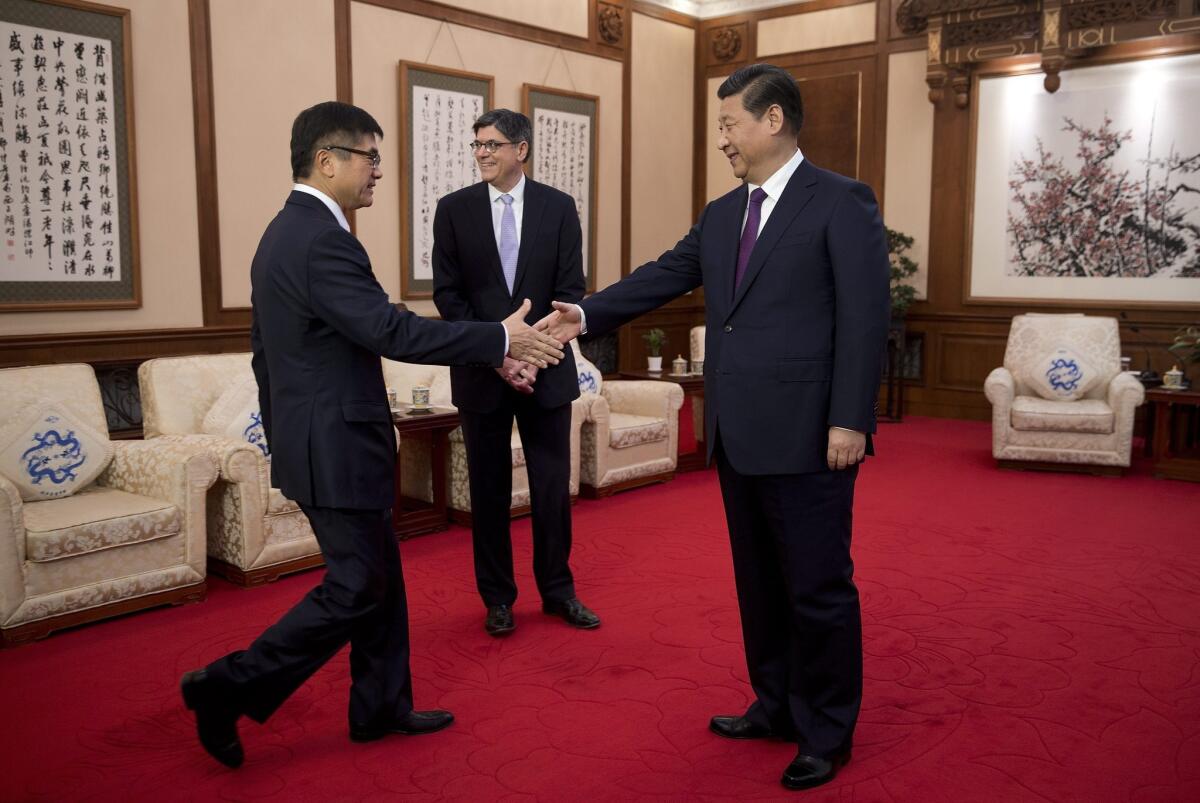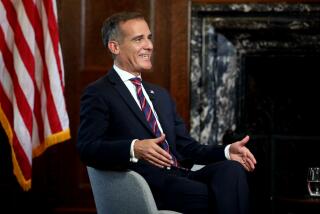U.S. Ambassador to China Gary Locke to resign

- Share via
BEIJING -- Gary Locke, the first Chinese American ambassador to Beijing, said Wednesday he will leave his post early next year to rejoin his wife and three children in Seattle.
The former Commerce secretary and two-term governor of Washington said his reasons for stepping down were purely personal, revolving around the education of his children, two of whom are in high school.
“We wanted our kids to have junior and senior year of high school back in the United States,” Locke said in a telephone interview on Wednesday from the Beijing Capital International Airport, where he was about to fly on a trade mission to Kunming in southwestern China.
Locke said he had personally informed President Obama of his decision to resign and that the president was supportive. “He is facing the same situation with his older daughter, Malia, who will be heading off to college in a few years,” Locke said. “He is very aware of how fast our children are growing up and how little time we have with them.”
Like many of his predecessors in the Beijing post, Locke has served a relatively short term, arriving in August 2011. The 63-year-old ambassador has been a relatively unassuming figure here, best known among ordinary Chinese for his modest lifestyle.
Photographs of the ambassador standing in line with a backpack to buy coffee at Starbucks and carrying his own luggage have gone viral on Internet sites here, with many comparing Locke favorably to Chinese officials with lackeys carrying their bags and umbrellas.
Locke’s most controversial moment in Beijing was his role in having the U.S. Embassy grant refuge to blind activist Chen Guangcheng after he escaped from house arrest in 2012.
Nevertheless, Locke never engendered the antipathy from the Chinese Communist Party that was directed at his predecessor, Jon Huntsman, the former Utah governor who some Chinese blamed for inciting sympathy protests in 2011 in support of the “Arab Spring.” (Huntsman was photographed at one such demonstration in Beijing, which he claimed to have stumbled on while out for a walk with his family.)
“He didn’t do as much talking as some of his predecessors, but he had a very distinguished working style that people respected. I found him very impressive and skillful,’” said Shi Yinhong, director of the American studies program at Beijing’s Renmin University. “It is quite surprising.”
In keeping with his trade background, Locke said he was proudest of his efforts “to promote U.S.-China relations in a way that also helps to create jobs in America.” Chinese investment in the United States in 2012 and the first nine months of 2013 reached $19.5 billion, compared with $17 billion for the preceding 11 years.
To promote Chinese tourism and trade, Locke said he had also shortened waiting times for U.S. visas from highs of 70 to 100 days down to between three and five days.
Locke’s wife, Mona, and their children left Beijing in July.
Locke denied speculation in Chinese social media that his family had been sent home because of Beijing’s notoriously hazardous air quality.
“Absolutely not. We are concerned about it [air quality], but that’s not what motivated us to go back,” he said.
Locke also scoffed at a report earlier this month in Politico suggesting that he had initially wanted a senior economic post at the White House, but “did little to impress Obama or his team, and was eventually shipped off to Beijing as ambassador.”
“Not at all,” Locke said when asked about the report. “I keep getting emails from the White House hoping I’m going to be here for the full four years.”
Locke’s departure date has not been set and he said only that he expects it will be early 2014.
As for his future plans, Locke said he is mindful of ethics rules that place limits on making certain career moves while serving as ambassador and therefore can’t say what he will do next.
“I’m still trying to figure out what I want to be when I grow up. I really have no idea,’’ he said.
ALSO:
Obama asks Senate leaders to hold off on new Iran sanctions
Mexican cartels abet heroin and meth surge in U.S., DEA study says
A Russian horror story: Gang sentenced for 12 murders at family home
More to Read
Sign up for Essential California
The most important California stories and recommendations in your inbox every morning.
You may occasionally receive promotional content from the Los Angeles Times.










